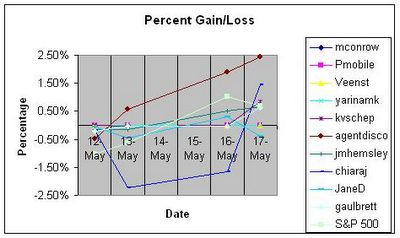Last week, we talked about the Present Value of money and worked a very simple problem to determine how much a single cash flow from the future would be worth today. If you missed that simple review, you can find it
here.
Today we are going to learn how to calculate the value of money you have today and find out how much it would be worth in the future if you saved it or invested it. This value is called the Future Value (FV) of money.
This is actually a very simple equation. You take the money you have today (PV or C0) and multiply it by the interest rate ( r ) and add 1:
FV = PV * ( 1 + r )
This equation gives you the Future Value of an amount of money for some period of time. Let’s plug in some numbers and see what we get. Let’s say we have $1,000 and would like to put it in a bank that offers an annual 3.25% interest rate. How much will it be worth in a year?
FV = $1,000 * ( 1 + .0325) = $1,032.50
If you saved $1,000 in a bank, in a year it would be worth $1,032.50. This is fairly simple. Where this simple equation, in addition to the PV equation, becomes quite useful is when you are trying to determine the values of a number of different cash flows.
This leads us to a discussion on finding the Present Value (PV) and Future Values (FV) of multiple cash flows. Let’s return to the PV equation:
PV = C1 / (1 + r )
This equation tells us how much a cash flow one period from now (from now on we’ll assume a period = a year for simplicity sake, but really C1 stands for a cash flow in period 1) will be worth today. Suppose we want to know the value of a cash flow 2 years from now? We would have to discount the interest rate ( r ) by the additional year. So you would get this equation, where C2 is the Year 2 cash flow and the exponent “2” represents the annual interest rate invested over two years:
PV = C2 / (1 + r )^2
Let’s use some real numbers to see how this plays out. If I were to receive $22,000 two years from now, and I could invest that amount in a mutual fund today that has traditionally earned 10% (the opportunity cost of not having the money today), what is that $22,000 worth today?
PV = $22,000 / (1.1)2 = $18,181.82
Now let’s figure out how much a string of cash flows would be worth. Let’s say someone is giving you a business that for 4 years will pay you $3,000 in profits (if only we were all so lucky) every year. How could you find out how much that is worth? Well you can figure out how much each of the cash flows would be worth in its specific year and then add them together. We’ll assume that we could put the money in the bank today and get 3.25% interest. The equation for this example would look like this:
PV = [$3,000 / (1.0325)] + [$3,000 / (1.0325)^2] + [$3,000 / (1.0325)^3] + [$3,000 / (1.0325)^4] = $11,084.95
The value of the business today is $11,084.95. Pretty simple right? Well, there is actually a short cut equation that you can use to find the PV of a string of cash flows which are the same. The equation looks like this:
PV = (C / r ) * [ 1 – 1 / (1 + r)^n]
Or for FV it looks like this:
FV = (C / r ) * [{(1 + r)^n} – 1]
These are called annuities. By using algebra, you can solve for parts of the equations to answer questions about money. Let’s use them to figure out how much money I need to save to retire. If I wanted to have a million dollars when I retire (in 30 years) and I knew I could get 10% in a mutual fund starting today, how much money should I contribute a year?
FV = $1,000,000
r = 10%
n = 30
$1,000,000 = (C / 0.1)*[{(1.1)^30} – 1] =
I would have to contribute $6,079.25 a year to have $1,000,000 in 30 years at 10% interest.
Plug your own numbers in. Need to know how much interest you’re paying on your car loan? Plug it in:
You make $375 monthly payments (C) on a $15,000 (PV) car for the next 4 years (n/12). Just solve for r:
$15,000 = ($375/r)*[1 – 1/(1+r)^48]
In this particular problem, you’re monthly interest rate would be 0.77015%. This would compound to an APR of about 9.242%. There you have it. This is the power of the time value of money. If you have any questions, please leave a comment. There will more to come!









